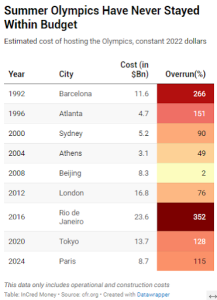The Paris Olympics 2024 have kicked off in earnest following the opening ceremony held on Friday! I’ve always enjoyed the two-week period when the games are in full swing, and like millions of other Indians, I’ll be keeping a close eye on our medals tally.
This year Paris is hosting the Olympics after exactly 100 years of hosting it the last time in 1924. While they lost the bids to host the Olympics in 2008 and 2012, they were determined not to lose this one.
Getting an opportunity to host the Olympics is not an easy task. It involves multiple rounds of bidding with the International Olympic Committee (IOC) to demonstrate your city’s worthiness to host the Olympics.
But why do countries want to host the Olympics and is it really worth it?
The primary reasons for hosting such an extravagant event are the ‘pride’ and ‘prestige’ that come with it. A country that reaches this level is recognized as having achieved a significant status in the global order and gains a positive brand image.
Another reason is the opportunity to “get the house in order”—an incentive to improve infrastructure, cleanliness, and overall organisation. It’s similar to why one might invite guests over to motivate keeping their home in top shape.
But the biggest justification that is given to host the Olympics is the large economic benefit that will accrue to that country. According to the Olympics official website:
- London 2022 Olympics created 1.1 lakh jobs between 2010 to 2017
- Rio 2016 Olympics awarded contracts to 2,200 SME businesses and created 18,000 jobs
- Tourism in Brazil in 2016 generated $6.2 Bn, a 6.2% y-o-y increase
Paris is estimated to create 1.81 Lakh new jobs and would generate an economic gain of $7.2-11.9 Bn.
But all these at what cost? Do the costs outweigh the benefits?
Hosting an Olympics is Expensive & every single Olympics since 1992 has gone over budget

While revenue barely keeps up!
- In 2008, Beijing had spent $40 billion to earn $3.6 billion
- In 2012, London spent $18 billion to generate just $5.2 billion in revenue
- In 2022, Tokyo spent $13 billion just to earn $5.8 billion in revenue
(The above costs do not account for inflation)
Worst part of it all, the IOC retains over half of the television revenue, which is usually the largest source of income.
Infrastructure becomes a ‘White Elephant’
Sydney’s Olympic stadium costs $30 million annually to maintain, and Beijing’s “Bird’s Nest” stadium needs $10 million yearly. Montreal’s “Big O(we)” stadium is infamous for its high costs. These venues are rarely used outside of occasional events, becoming a big financial burden. Our own experience with hosting the 2010 Commonwealth Games is also a testament to that.
Even though the 2016 Rio games were held just 2 years after the FIFA world cup (which meant certain infrastructure was already in place), it was marred by corruption, cost overruns and poor quality of infra. Rio required a $900 million bailout from the govt. to cover the cost of the Olympics.
It also ended badly for Athens who spent $11 billion on hosting the 2004 Olympics which arguably contributed to Greece’s debt crisis.
The only time the Olympics brought economic success to a city was in 1984 when LA hosted a $215 million surplus, thanks to its existing infrastructure.
It is expected that the total cost of hosting the Paris games would be under $10 billion — a cost overrun of only ~25%. Whether it will generate enough ROI to call it a success, only time will tell.
So, if you’re hoping that India should one day host the Olympics, be careful what you’re wishing for!
Coming back to the sporting side of things, I’m very excited about India’s prospects in Paris. With 110 athletes competing in 16 disciplines, I hope we have our best ever medals tally!
Till the next time,
Vijay
CEO – InCred Money
P.S. I share my thoughts on Investing and the Economy regularly. You can follow me here.







